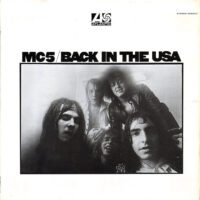
When MC5’s Wayne Kramer passed away on February 2 at age 75, it reminded me of Jeff Beck’s death last year at a seemingly too-young 78. Both masterly, septuagenarian guitarists exuded vitality and appeared to have a lot of creativity left in the tank when they shuffled off this mortal coil. It’s a sad state of affairs, but the treasure trove of life-enhancing music both made softens the blows.
As part of Detroit’s MC5, Kramer helped to draw the blueprint for both metal and punk with their cataclysmic 1969 debut, Kick Out The Jams. Their bombastic sonic attack combined with lyrics of personal and political revolution (plus explosive covers of Sun Ra, John Lee Hooker, and Ted Taylor tunes) resulted in one of the most dynamic first LPs in rock history. Elektra Records had a real monster on its hands.
But trouble ensued with vocalist Rob Tyner’s exhortation on the title track to “Kick out the jams, motherfuckers!” which some dweebs in high places simply could not tolerate. When MC5 placed a newspaper ad displaying Elektra’s logo that profanely admonished Detroit department store Hudson’s for not carrying Kick Out The Jams, the label dropped the band.
Picked up by Atlantic Records and working with producer/Rolling Stone writer Jon Landau, MC5 cut the much cleaner-sounding and more streamlined Back In The USA. Landau was a proponent of back-to-basics rock & roll, and he likely abhorred Kick Out The Jams‘ chaotic noisiness and freewheeling fervor, its striving for revolutionary sonic and lyrical content. Despite seeming like a poor fit for MC5, Landau tightened up the group’s songwriting and playing and many great songs spilled forth, albeit not without some corniness, too.
Back In The USA is bookended by enthusiastic covers of Little Richard’s “Tutti-Frutti” and Chuck Berry’s “Back In The USA.” Both are good, important songs, of course, but we don’t go to MC5 for R&R revivalism, do we? No. However, Landau and/or Atlantic seemingly demanded this return-to-roots concession. Similarly, the peppy, preppy MC5 original “High School” sounds out of character for the hell-raisers who a year earlier wrote and performed “Rocket Reducer No. 62 (Rama Lama Fa Fa Fa).” I like it anyway, but it’s sort of square for members of the White Panthers, you know. “Let Me Try” is a rare MC5 ballad with the same downer vibe and laggard tempo as Love’s “Signed D.C.” “Tonight” kicks off with Rob Tyner imploring, “All right, kids/let’s get together and have a ball,” before the band grinds out some rowdy, good-time rock that celebrates getting down in the USA—not tomorrow or in a week, but tonight, damn it.
“Looking At You” is where MC5 finally relocate their balls and blast out one of the most potent hooks in garage-rock history. Kramer’s wild, high-pitched, filigreed guitar solos lift this classic to godly heights. “Call Me Animal” is gnarly and ominous garage rock that Alice Cooper Group surely dug, while the proggy “The Human Being Lawnmower” could segue well into an Iron Butterfly deep cut.
“The American Ruse” stands as one of MC5’s peaks, using old-school rock & roll machinations to comment on US government scams and hypocrisy, of which they had first-hand knowledge, thanks in part to their presence at the 1968 Democratic National Convention, where they joined in the Vietnam War protests and were the only band to play. Notable for Rob Tyner’s mispronunciation of “stasis” to rhyme with “molasses,” “The American Ruse” pairs poorly with the title track’s chorus of “I’m so glad I’m living in the USA.” “Shakin’ Street” remains a zenith of cruising, masculine rock energy; it’s one of those tightly constructed, hooky songs that do everything you want in under two-and-a-half minutes. That “Shakin’ Street” didn’t top the charts is a damning indictment against Atlantic Records.
MC5 would loosen up and jam more freely and fiery on their swan song, High Time, but for a perceived “sell out” move, Back In The USA mostly holds up very well. Rest in power, Wayne Kramer.
Located in Seattle’s Fremont neighborhood, Jive Time is always looking to buy your unwanted records (provided they are in good condition) or offer credit for trade. We also buy record collections.



Lot of irony in the MC5 saga and some on Back in the USA is intentional. Like the title song which was a Chuck hit after he got out of the pen. One key to enjoying the LP is cranking the bass. The sound of the record may have been a mastering or mixing screw up. It actually got some airplay on progressive rock format like WHMC-AM outside of DC which may have gotten the attention of Mitchell and Nixon as the station in what was a Montgomery County farm town lost its license.